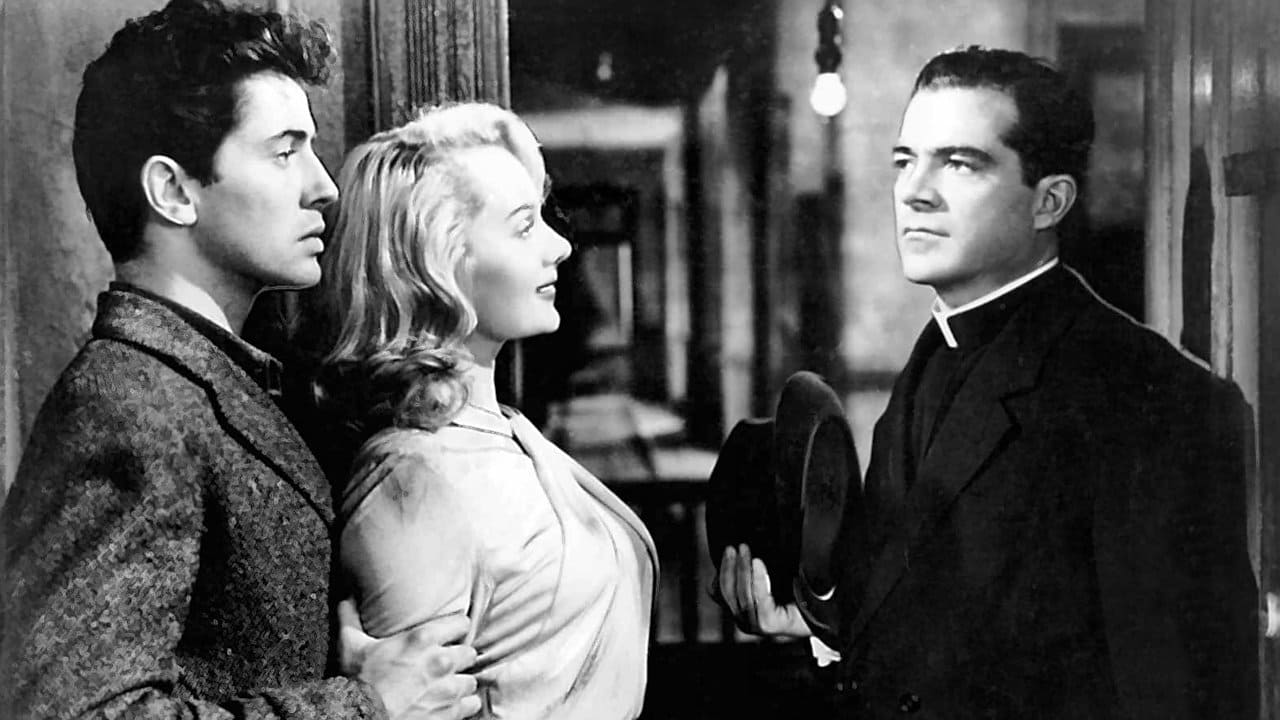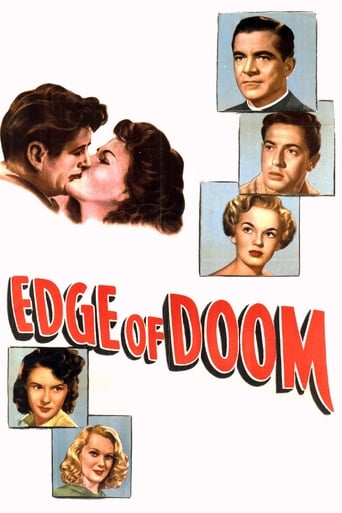

Edge of Doom is directed by Mark Robson and adapted to screenplay by Philip Yordan from the novel written by Leo Brady. It stars Dana Andrews, Farley Granger, Joan Evans, Robert Keith, Paul Stewart, Mala Powers and Adele Jergens. Music is by Hugo Friedhofer and cinematography by Harry Stradling.Give evil a root and it will grow and thrive.Relentlessly grim in thematics and mounted in classic film noir style by Robson and Stradling, if it were not for the heavy religio angle then we would be talking about one of film noir's highlights. Bookended by pious pontifications as Dana Andrews' priest offers his wisdom to a new understudy, everything in between is tinged by a bleakness as Granger's poverty stricken young man desperately tries to arrange a "big" funeral for his just deceased mother.With a mother fixation firmly planted on his shoulders, Martin Lynn trawls through the oppressive and unforgiving city looking for help but finding none. His employer, the church, nobody, so when his temper finally snaps he also has to contend with guilt and the police circling him like a straight-jacket. All the while Father Roth is hanging around to show the good side of the church, even turning into the punching preacher at one point. But can he grant salvation to a frantic Martin Lynn as his soul begins to fracture?Samuel Goldwyn effectively stopped backing the picture and Granger pretty much disowned it, unsurprisingly it flopped at the box office and has sort of languished in noir purgatory ever since. Shifting too much of the focus onto Father Roth really hurts the film, where Goldwyn had Robson do a re-edit and hired Ben Hecht to spruce up the religious theme. There's also a problem with Granger over acting at times, while Andrews is a touch miscast in a role tailor made for Pat O'Brien. Though the support players, particularly Keith and Stewart, more than compensate.There's enough bite in the narrative to do justice to the excellent visuals, a cynicism that haunts the shadows of this seamy side of the city, but this really should have, and could have, been so much better. 7/10
... View MoreOne of the reasons that I liked Edge Of Doom is the fact that Catholic priests are portrayed as human. In that the contrast in the behavior of Dana Andrews and Harold Vermilyea is the key to the film, not withstanding the performance of Farley Granger as the protagonist, a sensitive troubled youth driven to rage and murder.Harold Vermilyea is a thirty year veteran of the skid row parish he's been assigned to. Faces have changed, but conditions haven't and he's seeing that his religious message hasn't brought much change. He's suffering from the very human condition of burnout. So when Farley Granger who has a history with the church consisting of his father not being given a Catholic funeral because he was a suicide comes to Vermilyea asking for a big celebratory funeral for his mother who was a believer who never lost faith and being told no, the rage takes over him. He clubs Vermilyea with a heavy crucifix and kills him.Vermilyea is having a family crisis of his own, his niece has run off with a divorced man and is having a civil ceremony because the church won't marry them. He was also bound by Catholic rules not to give Granger's father a Catholic rite because of those selfsame rules. All that Granger doesn't know and when we seek guidance from clergy in any faith we never know what's in their background that could affect their actions with us.Anyway Granger spends the rest of the film with a troubled conscience which Dana Andrews suspects, but can't really prove. Since he hasn't come to him in confession there's no vow of silence unlike O.E. Hasse who tormented Montgomery Clift with that in I Confess. So Andrews is free to help the police investigation which is headed by Robert Keith.But Andrews is a priest in the best G.K. Chesterton tradition, as much concerned with Granger's soul as with solving the case. That's his dilemma. You can also see that he looks at Vermilyea and thinks that this could be him in another twenty years.Edge Of Doom is one of the bleakest noir films ever made. It offers no solutions to any problems. People seemed bound by fate and trapped by the dogma they believe. Some similar themes in a secular vein were also expressed in the Humphrey Bogart film Knock On Any Door which came out a year earlier with Bogart as an attorney and John Derek a young client who has a lot of history and baggage. It's a fine film, but prepare yourself for a real downer.
... View MoreI kinda liked this film--maybe it was the cast more than anything. The script was a bit lame @ x's. the author's son makes some comments that indicate that the book was deeper or something--but when a book is sold to Hollywood--the author gives up ownership, so to speak. this film came out in 1950 & 57 years later the son still sounds sore. Meanwhile, the book is like totally unavailable so a modern viewer of the film would be hard pressed to make comparisons. Anyhow, I thought that Farley Granger did an excellent job ( despite his negative views on the film). Also excellent were Paul Stewart, Mala Powes and Robert Keith. Joan Evans was given nothing to do & Dana Andrews was good--but the character was not written well.
... View MoreMy view is that this movie falls somewhere between hose two genres. I'd call it closer to soap opera. And how, with all the talent involved, it failed so badly, makes it something of a mystery as well.The same year, "Side Street" came out. Farley Granger was heartbreaking. He had been heartbreaking in the most poetic of all noirs two years earlier, too: "They Live By Night." Here he shows, and elicits, no emotion at all. His character is written as someone who's a little slow. But why? There were lots of young men living with, and fanatically attached to their mothers. There still are some.)(By the way, I read the entry by the person whose father wrote the original book and feel empathy. There is certainly potential here. The movie just seems to have lost its way -- and lost it very early, despite the ministrations of a fine director, Mark Robson, and a superb screenwriter, in Philip Yordan.) None of it rings true, to put it bluntly. None of the major parts, that is. The florist for whom Granger works is well played and convincing. But the major characters are not credible.) Dana Andrews is miscast or ill directed as the understanding young priest who tries to help Granger. He goes in for such seriousness he seems to be speaking his every word in a hushed sounds. His delivery reminds me of Anne Baxter's when she is trying to convince people of her sincerity in "All About Eve." She convinced them for a while but he doesn't convince me. None of the principals do. And what a shame, too: It has potential and is performed, written, and directed by major talents.None is at his best here.
... View More